Johanna C. Bendell, MD from Sarah Cannon discusses and ASCO 2020 abstract entitled A phase I/II, two-part, multicenter, first-in-human study of DS-7300a in patients with advanced solid malignant tumors
Context:
B7 homologue 3 (B7-H3) is a protein that is overexpressed in different forms of cancer, including squamous cell carcinoma of the lung, head and neck, prostate, esophageal, and breast. Overexpression of B7-H3 is related to poor prognosis because it facilitates increased cancer cell invasive and metastatic potential (Dong P, et al. Front Oncol. 2018;8:264). No targeted cancer therapies with B7-H3 are currently approved. DS-7300a is an antibody-drug conjugate made up of a monoclonal anti-B7-H3 IgG1 humanized antibody (MABX-9001a) conjugated to a drug linker that releases its payload upon cancer cell internalization. The payload, DXd, is a derivative of exatecan that inhibits topoisomerase I, an enzyme for replication and transcription that relaxes supercoiled DNA. DS-7300a induced in vitro apoptosis in cancer cells and demonstrated powerful antitumor activity in xenograft models of different forms of in vivo solid tumors.
Approaches:
In patients with selected advanced solid tumors (NCT04145622) this phase 1/2, multicenter, non-randomised, open-label, first-in-human study of DS-7300a is underway in the United States and Japan. There are 2 parts to this study: dose escalation (part 1) and dose expansion (part 2). The primary objectives are to assess DS-7300a ‘s protection, tolerability and antitumor activity and to evaluate the maximum tolerated dose or recommended dose for the expansion portion. Secondary goals include the pharmacokinetic characterization of DS-7300a, the determination of total antibody and drug portion anti-B7-H3 levels (DXd), and the occurrence of anti-drug antibodies against DS-7300a assessment. Main inclusion requirements are age between 18 years of age (US) or 20 years of age (Japan), ECOG output status of 0 or 1, RECIST 1.1 observable lesion as measured by the investigator, and agree to the provision of pre- and on-treatment tissue samples (obligatory if clinically approved and not contraindicated). Prior treatment with orlotamab, enoblituzumab, other B7-H3-targeted agents, or an antibody-drug conjugate that is conjugated with an inhibitor of topoisomerase I are main exclusion criteria. Three cohorts, including patients with selected advanced solid tumors, will initiate the dose expansion. DS-7300a will be intravenously administered in both parts on day 1 of each 21-day cycle. The starting dose of DS-7300a is 0.8 mg / kg during dose escalation. Currently, this trial is in the dose-escalation portion. Data on clinical trials: NCT04145622.

